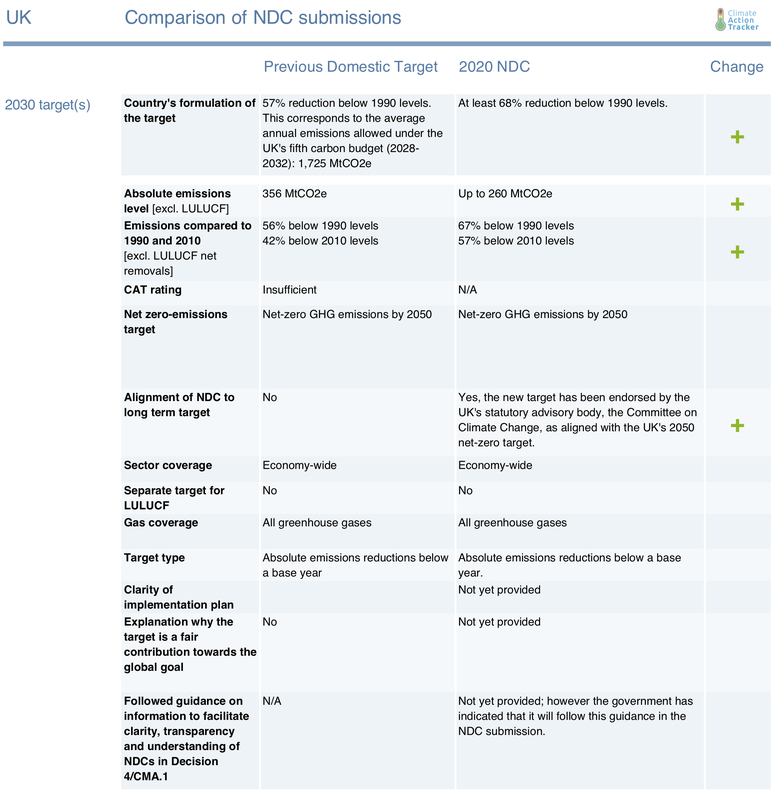CAT Climate Target Update Tracker
United Kingdom
Summary
UK announces NDC in advance of Climate Ambition Summit
The UK Government announced a stronger 2030 domestic emissions target of a 68% reduction below 1990 levels in its first Nationally Determined Contribution (NDC), committing the UK to an ambitious level of domestic climate action. The 68% target is a significant strengthening of its previous 57% target, and now places the UK on a path to achieve its 2050 net-zero GHG emissions target. This development would make the UK one of the first countries globally to bring its domestic emissions into line with what would be necessary globally for the Paris Agreement’s 1.5°C limit.
The domestic emission reduction target put forward under the NDC does not, however, include equity considerations needed for the UK to achieve a fair-share contribution. This requires additional emissions reductions to be achieved abroad through support measures such as climate finance and/or international credits. The total fair-share contribution of the UK – domestic emission reductions and emissions reductions achieved abroad would need to be equivalent to the UK reaching close to zero emissions by 2030.
Scroll down for a detailed analysis of the UK’s announced NDC target or click the button to view the latest CAT assessment for the UK.
CAT analysis of NDC announcement

On 3 December 2020, the UK announced its first Nationally Determined Contribution (NDC) committing to a 68% reduction in GHG emissions below 1990 levels by 2030.
A 68% reduction in domestic GHG emissions is a significant strengthening of its previous 2030 target of a 57% reduction below 1990 levels derived from the UK’s fifth carbon budget (2028-2032). It is also broadly aligned with the rate of necessary global emission reductions implied by 1.5°C global mitigation pathways published by the International Panel on Climate Change (IPCC), as well as a range of country specific modelling results analysing a 1.5°C compatible domestic emissions reduction contribution. Such modelling pathways assume some carbon dioxide removal in the second half of the century. If reliance on removals is to be avoided, the short term reductions would have to be more stringent to be in line with 1.5°C.
The NDC does not, however, include additional emission reductions from abroad to ensure the UK is contributing its fair share to the global 1.5°C emission reduction burden according to equity considerations. The UK Government has committed to not using international credits to meet its domestic 68% target, in line with advice from its statutory advisory body the Committee on Climate Change (CCC). However, the CCC noted that it supports the use of such credits to move beyond its 68% target. It further asserted that the UK NDC should be accompanied by greater support for climate finance, particularly for developing countries. This comes at a time when the UK government recently reduced development finance from 0.7% of GDP to 0.5%.
The advice of the CCC aligns with the CAT’s assessment of the UK’s announced NDC that additional emission reductions from abroad are required for the UK to achieve a 1.5°C compatible fair share contribution to the necessary global emission reductions.
Due to methodological complexities stemming from the UK’s decision to leave the EU, the CAT is not currently able to provide an exact fair-share rating for the UK’s announced NDC. However, upon resolution of these methodological requirements, such a rating will be forthcoming.
The UK Government’s recently released emissions projections under current policies show that the UK is currently not on track to achieve its former 57% target, let alone its newly announced 68% target. Recently announced policies, including a 2030 ban on the sale of fossil fuel cars and a ramping up of renewable energy investment, particularly into offshore wind, are the kind of ambitious actions that will be required across all sectors of the UK economy to meet its new 2030 NDC and its 2050 net-zero target.
The NDC does not cover emissions from international aviation and shipping emissions, both sectors the CCC has encouraged the UK Government to commit to achieving reductions in. The UK Government has, however, indicated its support for multilateral action to tackle international aviation and shipping emissions through the International Civil Aviation Organisation and International Maritime Organisation.
The UK now has a golden opportunity to lead from the front as host of the upcoming Climate Ambition Summit on December 12. The UK should leverage its ambitious new 2030 NDC by pressuring world leaders to set similarly ambitious 2030 targets and long-term net-zero targets. In addition, an announcement at the summit of considerable support measures to poorer nations towards climate mitigation efforts would make the UK a true global front-runner beyond their ambitious new domestic target.
Assumptions
The UK NDC announcement does not specify whether it covers emissions from the land use, land use change and forestry sector (LULUCF). As the UK’s previous domestic emissions target included emissions from this sector, we have assumed that they are included in the new NDC. We assume removals from this sector in line with the latest government emission projections under current policies to quantify the target excluding LULUCF emissions. We assume, as in the previous domestic target, that the NDC covers all greenhouse gases, and that the target is economy-wide.
Links
Stay informed
Subscribe to our newsletter
